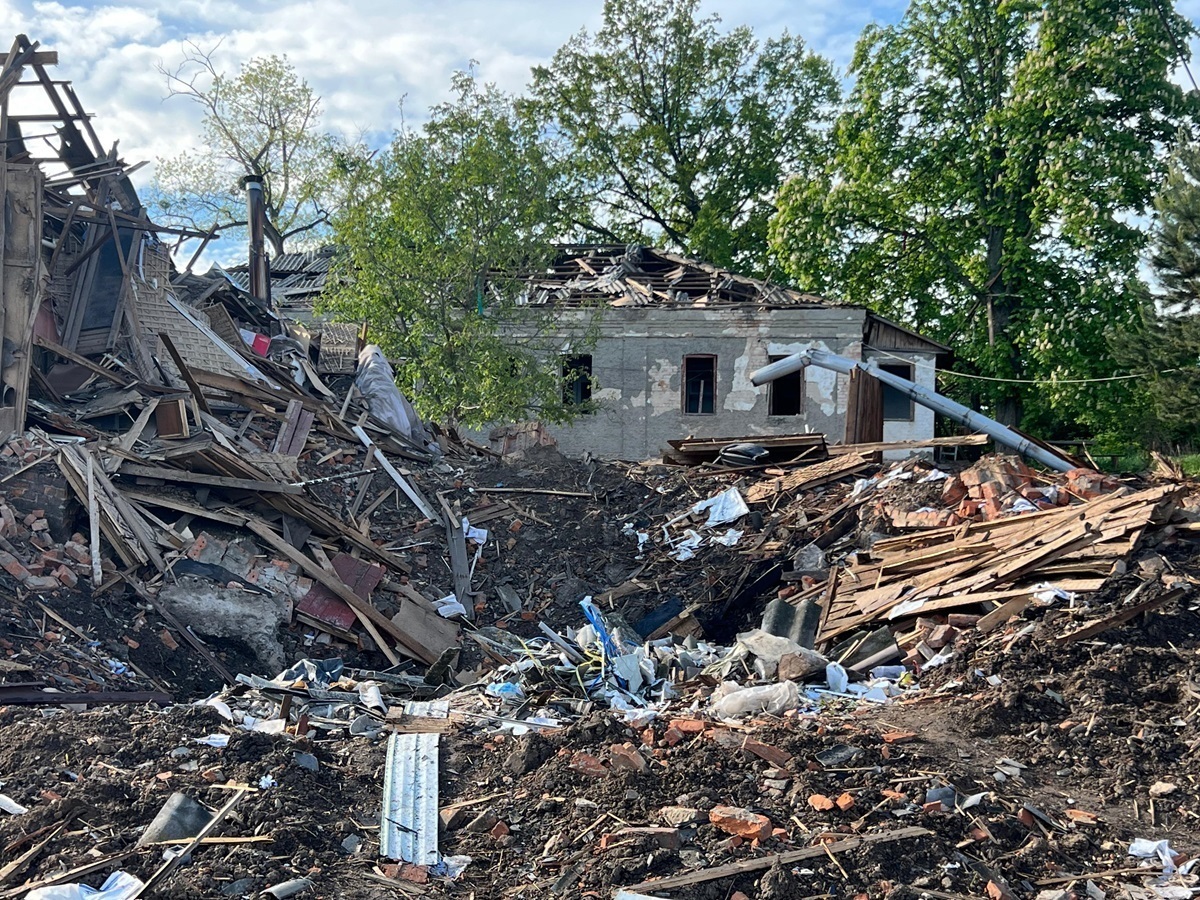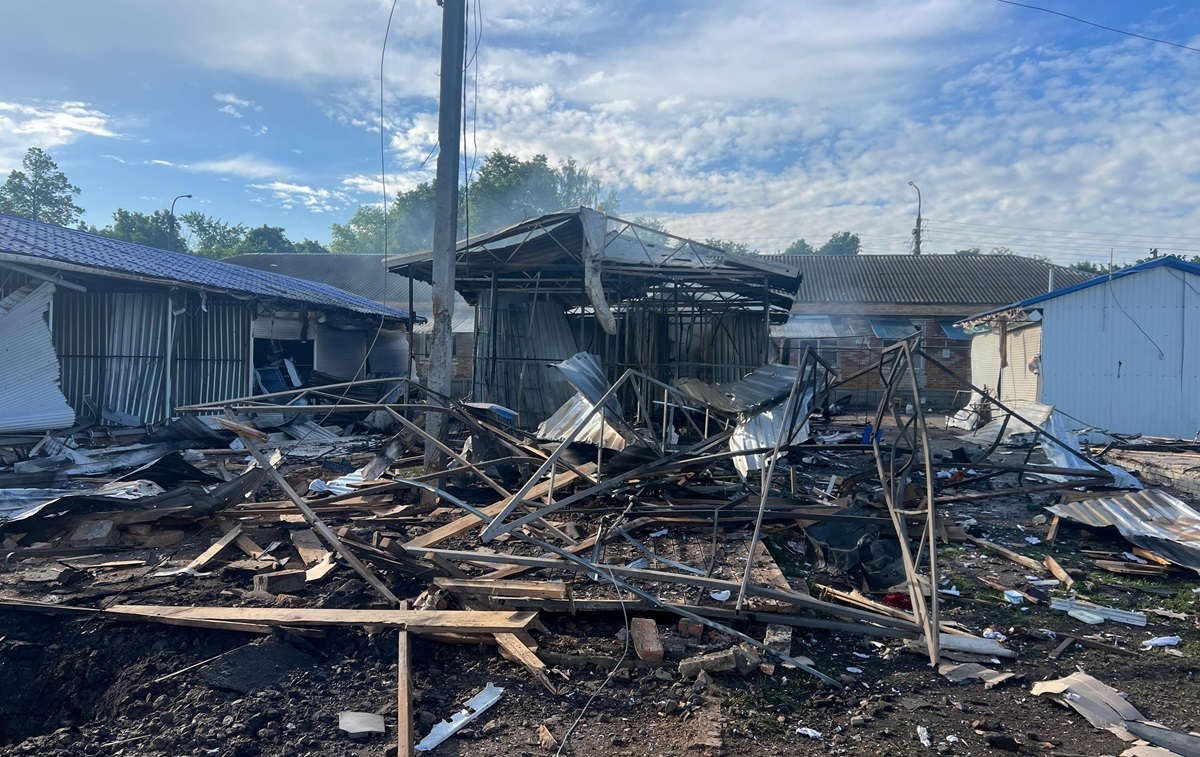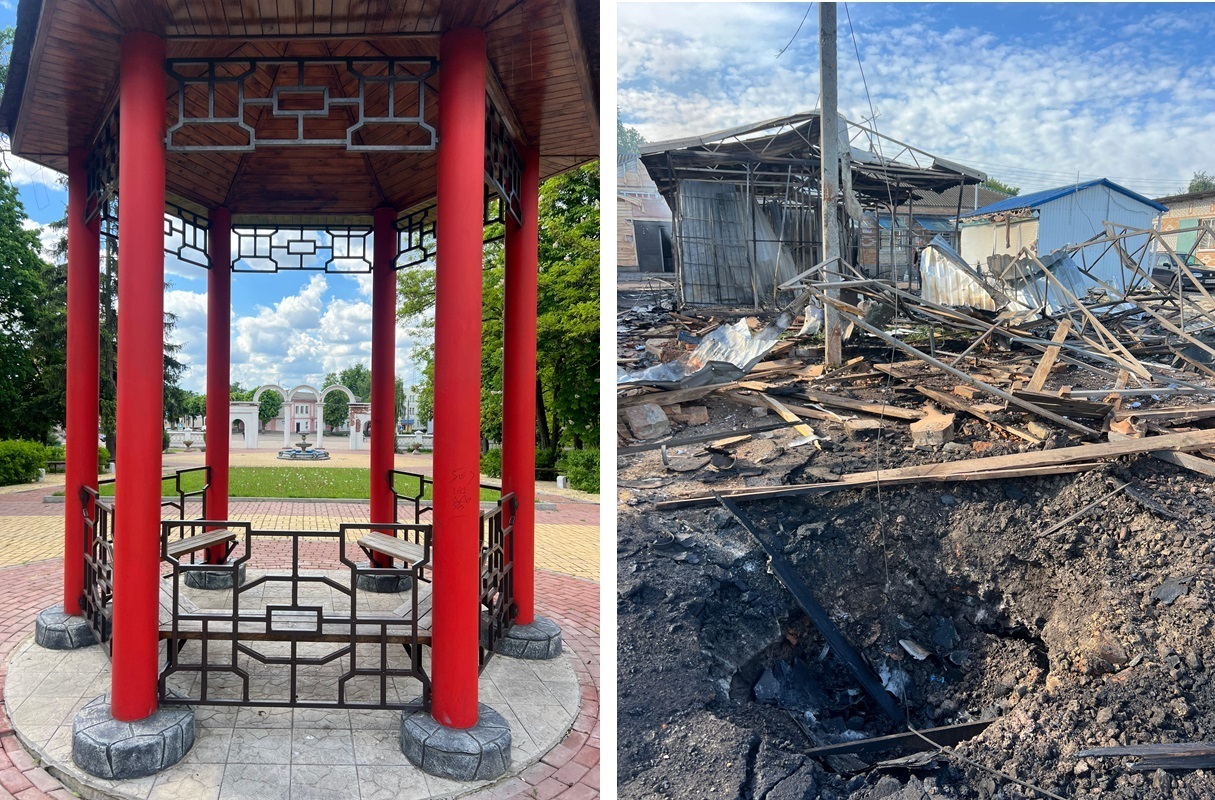A community at gunpoint. Bilopillia amidst roses and lancets
Yurii Zarko, Head of the Bilopillia community in the Sumy region, describes the situation at the border, the forced division of the community, and planting roses under fire.
By Dmytro Syniak
On the morning of 17 May, a shuttle bus left Bilopillia en route to Sumy, carrying people who had decided to evacuate to safer cities and villages. After all, the russian border is no more than ten kilometres away, and russian drones and artillery have long threatened the lives of the local residents. For many of the passengers, mostly elderly men and women, the decision to evacuate was not an easy one… The minibus was full, with all 15 seats occupied by passengers. The driver was the sixteenth passenger. At 6:17 in the morning on the way out of the city, the minibus was targeted by a 12 kg russian Lancet drone. This drone can penetrate armour up to 215 mm thick or a reinforced concrete slab up to 550 mm thick when used in the air or underwater. The explosion tore the defenceless minibus apart. Nine people, mainly elderly women, died instantly. Among the deceased was a family: a father, a mother, and their daughter. Seven of the injured were taken to hospital.
This strike was yet another indication that, for russia, there is no such category as ‘civilian’, ‘evacuation’, or ‘humanity’. Bilopillia appeared on the world’s media maps, not because it was seeking attention, but because it had experienced the unthinkable.
We discussed the losses, the community divided by the war, and the roses that grow even under fire.
How are the people who were injured in the russian attack feeling?
Their condition is stable. Three of them are still in hospital because they need further treatment, while the rest have been sent home. The attack was terrible. It is fortunate that seven people survived, despite being injured. The bus driver is among them.
What kind of bus was it? Where was it going? Why was it so close to the border?
It was a regular bus running from Bilopillia to Sumy. It was mainly used for evacuation. Some passengers were going home to collect their belongings or food. The bus was clearly marked as non-military, with the route written in large letters on the sides. Therefore, we cannot accept the claim of russian propaganda sources that one of their drone operators made a mistake and mistook the bus for a military one. The russians knew everything!
Does that mean you still have regular buses?
Regular buses ran before this terrible incident. There were also transit buses: Putyvl–Sumy, Shostka–Sumy, and Hlukhiv–Sumy. Now, they hardly run at all. As a result, around 2,500 people have been left with limited communication with the outside world. At least, without regular communication. Although there are still opportunities to leave, the further you go, the greater the risk. Most of those who stayed are pensioners. Many of them say they will die in Bilopillia. Perhaps they will change their minds. Before the full-scale invasion, 16,000 people lived in Bilopillia alone and almost 23,000 people lived in the entire community. Our community covers 52 villages, a settlement, and a city. Our area extends over 543 square kilometres.
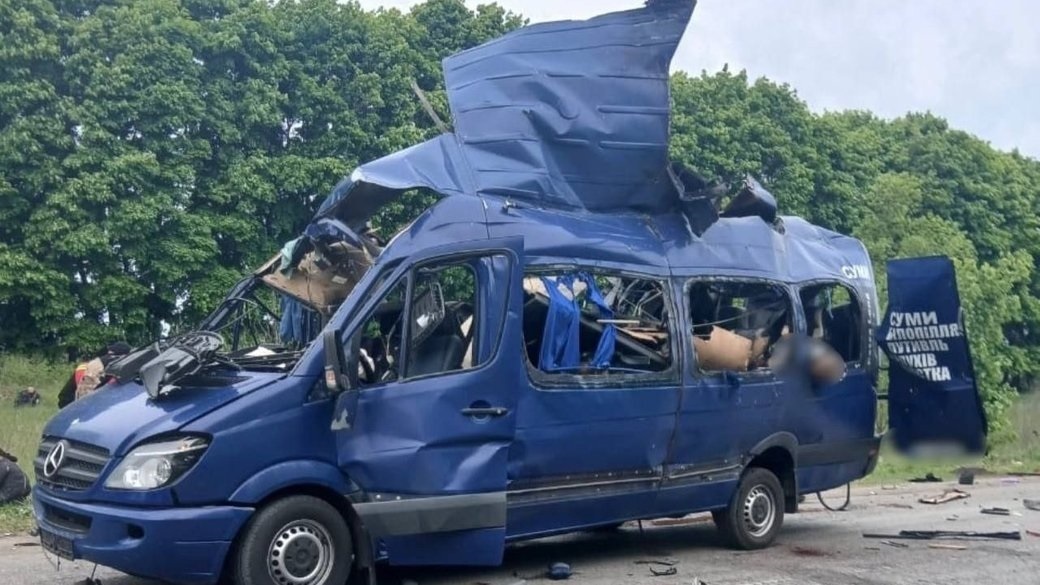
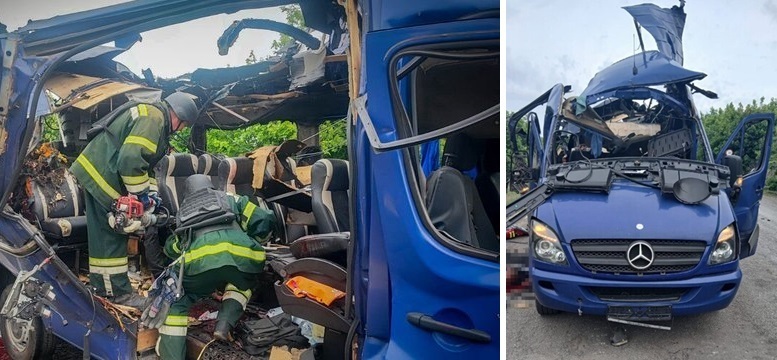
The minibus was targeted by a 12 kg russian Lancet drone
What does the russian border mean for your community?
In the past, we could say that the local residents sometimes got some work in the area. But now it is definitely our curse, misfortune, problem, and grief. The whole 43 kilometres of the border! Twenty-six villages stretch along this line, and now there are practically no people in them. Ghost villages! The maximum distance of our localities from the border is 24 kilometres. As you can imagine, we are now a ‘community on fire’.
Should people be forcibly resettled from the border area?
Yes, it is between five and ten kilometres, depending on the location. On average, it is 7–8 kilometres from the border. Unfortunately, the centre of our community, the city of Bilopillia, is partially within this zone. We simply evacuate children without discussion, but we do not forcibly evacuate elderly people; we treat them with understanding. However, we strongly advise them to comply with the military’s demands. These demands have not arisen out of nowhere; they are clearly visible and audible here now. Our community is now divided into two: the ten-kilometre zone and the rest.
The Bilopillia community on the map with Putyvl, Sumy, and Sudzha
What is life in the community like? Are there any amenities, such as electricity?
So far, there is electricity, although the russians are gradually dismantling our energy infrastructure. This afternoon, a power supply facility was damaged, leaving the city completely without water. We will repair it for now, and then we will see what happens. However, communication is difficult as there is almost no mobile connection. The only thing left is the Starlink internet connection. Shops and pharmacies are operating sporadically. However, basic services are still being provided.
Did the attack on the minibus indicate an increase in russian attacks?
On the contrary, they had actually decreased slightly beforehand. Before that, there were dozens of guided bombs. I estimate that around 120 of them have reached our community over the entire period. At the same time, multiple launch rocket systems (MLRS) have become more active. There are also lots of drones, especially those bloody Lancets. The russians have now changed their tactics; they are launching their Lancets vertically downwards like ballistic missiles. This causes much more destruction. Most attacks take place at night. Yesterday, our community was hit by drones; today, by MLRS…
How are people feeling? What effect did the attack on the minibus have on them?
It had a serious effect. Those who were still considering whether to leave or not made an urgent decision to leave. They realised that the russians were cutting off the road, thereby taking control of it. As a result of russian shelling, 35 civilians have been killed and more than 40 have been seriously injured in the full-scale war. Most of these casualties occurred in the last six months. Therefore, people have started to leave more actively. Fortunately, the Armed Forces of Ukraine are so far preventing the enemy from advancing. The situation in the villages far from the border is generally better than in Bilopillia because these villages are subject to fewer attacks than the city. However, people are gradually leaving even those areas.
Do you receive help from international donor organisations?
I have no idea how to categorise the organisations that help us. Is the Red Cross, for example, a donor organisation? We also regularly receive help from the White Angels Foundation of the Ministry of Internal Affairs, the Proliska humanitarian mission, and State Emergency Service units.
What does your community need the most right now?
We need vehicles in the event of a mass evacuation ordered by the military. As we do not have a military administration, the decision is made by certain unit commanders and the Sumy Regional Military Administration.
Do your partners in the ‘Shoulder-to-Shoulder: Cohesive Communities’ project help your community?
Yes, we have signed three memoranda under this programme, with the cities of Zhydachiv and Truskavets in the Lviv region and Zbarazh in the Ternopil region. However, for now, cooperation is only planned in the humanitarian area, involving children’s recreation, sports competitions, and joint participation in various cultural and sporting events.
Do you manage to protect utility vehicles from russian drones?
We relocate them to a safe place every day. Our greatest asset is an evacuation bus that was donated to us by a Hungarian community. It has been under fire three times, but we have managed to fix it each time.
What about the community budget?
Right now, we only have enough money to cover salaries for 10 months this year. The shortfall is covered by the state budget, but not in full, as I have already told you. Last quarter, for example, we received only UAH 5 million of the UAH 15 million we needed. Half of the community is in an active combat zone where producers, farmers, and entrepreneurs are exempt from paying any taxes whatsoever. We receive no rent or lease payments at all. Due to the fighting, more than 20,000 hectares of land have been taken out of production. The community’s territory is covered with mines and all kinds of unexploded ordnance…
Destruction in the Bilopillia community
What are your priorities as the head of the community?
The situation can change very quickly, so it depends on what is happening. However, the main task is always to save people’s lives. The next most important task is to evacuate residents, documentation, and material assets. Then we must provide those who remain with everything they need. This includes food and access to medical and other services. However, medical services are the top priority.
What about medical services? Have they been relocated to a safe place, or are they being protected in some way?
We have not relocated anything yet. However, many young doctors with small children have left for safer areas. Consequently, only a few primary care doctors remain. At the same time, though, our hospital and the polyclinic are still operating, albeit to a limited extent.
Where are you evacuating people to?
They are being directed by a specially created evacuation headquarters in Sumy. However, many are going to stay with relatives, friends, or people they know. I must say that there have been no accommodation issues so far, despite the fact that 90% of people have already been evacuated.
Are you receiving advice from other communities that have already undergone this terrible experience?
Yes, I have the phone numbers of many colleagues from the Kherson and Zaporizhzhia regions. With their guidance, we have successfully transitioned all our servers to the cloud. This means that we can work with the servers from anywhere in Ukraine and at any time; our employees in relatively safe areas can get in touch and continue providing essential services.
Does your community provide assistance to the military?
Yes, because we understand the importance of this better than anyone else. Last year, despite not having enough money to pay salaries, we allocated around 15 per cent of our revenues to support the army. This was spent on constructing defensive fortifications, buying fuel and maintaining our territorial defence unit, which we created on 25 February 2022. Currently, this unit has evolved into one of the best voluntary formations in the Sumy region. Our soldiers are part of the Armed Forces of Ukraine and carry out combat orders directly from Armed Forces commanders at the front line on our border. They are literally defending their own homes, as well as Ukraine as a whole and its state border. The Bilopillia City Council fully supports this unit. We provide them with transport, fuel, lubricants, uniforms, and salaries that range from UAH 15,000 to 30,000 per month…
What would you like to tell MPs and government officials? Do you think they could make your work easier or strengthen your community’s defences?
I would like to ask our voluntary defence formation to do the same. Our brave men and women carry out many dangerous tasks that put their lives at great risk, yet they are not combatants. In my opinion, this is wrong. According to order 1112, which concerns education, I would have to close more than half of our 12 schools. However, in order to do so, I need to convene a session of the city council. In the current circumstances, this is almost unrealistic — not only here, but in all the border communities of the Sumy region. Unfortunately, some of our councillors are politicising this issue, prioritising the interests of their parties over those of the community. They argue, ‘We didn’t open these schools, so why should we close them?’ From 1 September, only three of our six schools will receive funding. I have no idea what to do.
Are your schools working online now?
Yes, and they have been working like this for five years: two years during the pandemic and three years during the war. It would now be appropriate to merge these schools. Many children have left with their families and probably will never return. However, a city council session must be convened for this to happen, but the councillors are refusing to meet.
How does the public sector function under constant shelling?
You should come and see how clean our community is! Soldiers who have seen various communities on the front line and at the border are always amazed about this. Huge guided bombs are falling by the dozen, and yet everything is tidy and neat. The grass is cut and roses are growing. We planted some today and will plant many more in the future. Women and pensioners bear the main burden, having long since decided to stay until the end, for as long as necessary and possible. However, we no longer have anyone to repair roofs or glaze windows as there are no specialists left. The staffing situation at Teploservis, which provides the city with heat, is catastrophic. The only saving grace is that the heating season is already over.
In Bilopillia, destructed buildings are located next to well-kept, cosy spots. This is the city’s main feature that surprises visitors
Is it sensible to spend money on roses when there is a budget deficit?
We are not spending any money. It is entirely the initiative of our employees. They prepared the seedlings and did everything themselves. There were so many seedlings that we had to share them with neighbouring communities. Let our roses bloom there, too. Despite the war. As I said, we are optimistic. If roses bloom in the city with clean streets and essential services provided, then the city is still alive. And we want it to live forever.
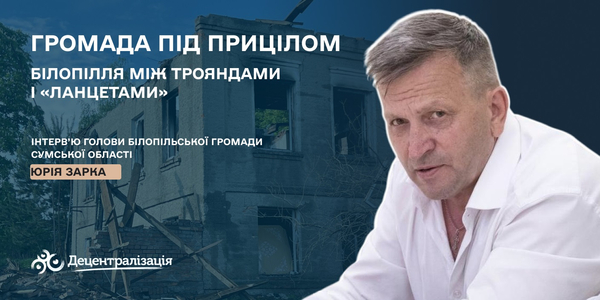
Tags:
Область:
Сумська областьГромади:
Білопільська територіальна громадаSource:
Decentralization portal
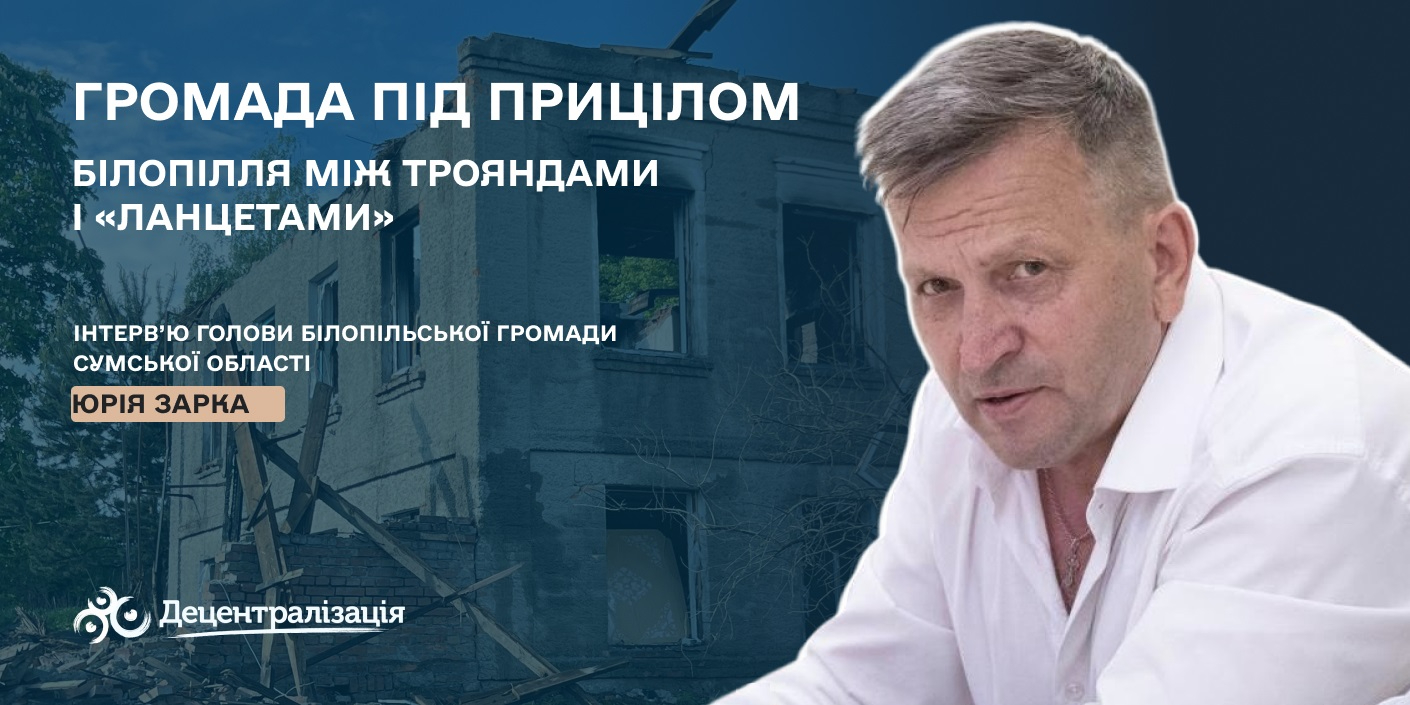
30 January 2026
15 громад Прикарпаття об’єднуються навколо...
У місті Галич керівники 15 територіальних громад Івано-Франківської області підписали меморандум про співпрацю, який...
29 January 2026
Олексій Рябикін: схвалений Урядом законопроєкт закладає європейські правила розмежування повноважень
Олексій Рябикін: схвалений Урядом законопроєкт...
«Цей закон закладає основу для європейської моделі публічного врядування в Україні – з чітким розмежуванням...
29 January 2026
Цифровий контроль ДІАМ: як «Прозоре будівництво» змінює правила гри для громад
Цифровий контроль ДІАМ: як «Прозоре...
Запуск цифрового застосунку «Прозоре будівництво» для фахівців державного архітектурно-будівельного контролю є...
29 January 2026
Communities will be able to independently...
The Government has approved amendments to its Resolution No. 1364 dated 6 December 2022, which introduce a clearer...


